You don't necessarily associate Thom Yorke with fun. Radiohead's frontman and principal songwriter has tended to have different kinds of adjectives attached to him in his two decades in the music pages: "intense", "tortured" and "angst-ridden", or "impassioned", "essential" and "important". Though Radiohead's music has always carried a complex cathartic charge, simple pleasure, for better or worse, has never quite seemed his thing. He may have sold 30m albums, and from time to time been widely touted as the leader of "the world's biggest rock band", but along the way Yorke has generally given the appearance of a man who stands a better than average chance of being refused entry to a happy hour.
Still, sitting in a crowded cafe off Shoreditch High Street in east London, drinking morning tea, he has of late, he tells me a little anxiously, been trying on fun for size. It might be growing on him. Yorke is a slight, quick-witted presence; when he walks in there is not a flicker of recognition on the faces around us. You guess he likes it that way. He is wary of pretension, alive to all shades of irony. "I'm 44 now," he says, with a short laugh. "And I did start thinking, if I can't enjoy this now, when am I going to start?"
Some of this has to do with greater freedom. For a long while, he says, after the initial, enormous success of Radiohead, which he had started with his mates at Abingdon School aged 15, he "definitely felt trapped in the whole thing. I think we all did. Particularly after we started to have children and stuff." Yorke's two children are 10 and six. He has lived with Rachel, their mother, in Oxford since they met studying fine art at Exeter University. Those facts are clearly very important to him. "You know, making a record, going on tour is a huge commitment, particularly the way we do it, a lot of work. And when we first had young kids we were all like, Christ! Do we really want to be doing this the rest of our lives? Much as people still seemed to want us to, there were big knock-on consequences for the ones we love."
One tentative escape for Yorke from those questions was his 2006 album The Eraser, a twitchy, experimental, electronic collection of doomy dance tracks that grew out of his laptop, and which he put together with producer Nigel Godrich. He promoted it at the time with a typically defensive blog to Radiohead fans: "I want no crap about me being a traitor or whatever splitting up blah blah this was all done with their blessing," he wrote. "And I don't wanna hear that word solo."
The album contained Harrowdown Hill, his soul-searching examination of the death of Dr David Kelly, while its primary impulse, he said at the time, was anxiety about climate change. But it was in some ways at least a gesture toward liberation. In among it was a song called Atoms for Peace, once the motto of the International Atomic Energy Agency. The opening lines sounded a bit like a personal manifesto for a new kind of lightness (they were, he later claimed, something of an admonition from Rachel): "No more going to the dark side with your flying saucer eyes. No more falling down a wormhole that I have to pull you out... "
Having made the album out of loops that began in his head and ended up on his computer, Yorke became intrigued to see if it could be played live. In 2009 he gathered a band of friends together – don't say the word "supergroup" – whom he thought might be up for the challenge: Flea, the bassist of the Red Hot Chili Peppers; Joey Waronker, drummer with Beck and REM; Mauro Refosco, a Brazilian percussionist who plays with David Byrne; and Nigel Godrich, to help pull it all together. In working out how to do some of the digital bloops and beats, they spent a lot of time in the hardware store, "buying rivets and stuff". "The first time we got together was in this place in Laurel Canyon in LA," he recalls. "We did a song called The Clock and it sounded like a bomb going off, it was just amazing. The Eraser is a headphone record really, so to hear it go bang in a room was quite something for me."
The band, initially billed warily as "??????", subsequently known as Atoms for Peace, did a short American tour playing the whole of The Eraser. At the end of it, and having had "a total blast", they locked themselves in a studio for three days and started improvising some more. "I had these very small ideas," Yorke recalls, "just beats mostly. And we just played off them for about three days solid." The epic 10 hours or so of usable music they created Yorke edited down into a new album, adding lyrics and again working closely with Godrich. It's called Amok and is by turns dense, trippy, danceable and occasionally, whisper it, upbeat. Does he see it, I wonder, as coming from a different, less angry kind of emotional place to archetypal Radiohead?
He does, with caveats. "Well," he says, "when I originally wrote that 'No more going to the dark side' line, it was kind of taking the piss. And the irony is that Radiohead have just done this big world tour last year and for the most part we had the best time we have ever had. And a lot of dance music is very angry in a good way. But yes, the idea was for once in my life just to enjoy the energy of it and not want to pull it apart. Nigel was constantly on at me: 'Don't make it dark!'"
Does he think that's a permanent shift?
"No, it depends where I am, I think. Maybe literally. I've been working at home over the winter and everything I've been doing is dark as fuck. But we did a lot of this away in Los Angeles and it was sunnier. It was something to do in the afternoon and evening before you went out. There is no way I'm really going to lose the old heavy work ethic. But we got close a few times."
Ever since Radiohead's first worldwide hit single, Creep, a song that Yorke sometimes refuses to play these days but which did define a certain alienated, contrarian idea about the band and himself – "I wish I was special" and "I don't belong here" and "I'm a creep, I'm a weirdo" – he has seemed weary of the cliche it implied. In profiles, much was made of Yorke's childhood difficulties, the fact that he was born with one eye fixed shut and only subsequently half-opened by a series of failed operations. The fact that because of his father's job as a chemical salesman he moved schools frequently, was picked on because of his eye, and withdrew. The fact that, at fee-paying Abingdon, he found his refuge in the music room. One way of looking at his career has been as a sort of journey away from the limitations of that analysis. The apparent absence of introspection on Amok must come as something of a relief, I say.
He smiles from under his stubble. "To begin with, writing songs was my way of dealing with shit. Early on it was all, 'Come inside my head and look at me'," he says. "But that sort of thing doesn't seem appropriate now. Tortured often seems the only way to do things early on, but that in itself becomes tired. By the time we were doing Kid A [their fourth album, released in 2000] I didn't feel I was writing about myself at all. I was chopping up lines and pulling them out of a hat. They were emotional but they weren't anything to do with me."
In that sense, he suggests, he hopes the music became much closer to what he feels we all experience day to day: a stream of words and images coming at you from different sources that you try to make some emotional sense of. The important thing, he thought, was to be open properly to that kind of white noise. He learned the habit directly from REM's Michael Stipe, who started as a hero and has long been a friend. "Michael is still my favourite lyricist," he says. "I loved the way he would take an emotion and then take a step back from it and in doing so make it so much more powerful."
More like channelling emotion than attempting to articulate it from within?
"Something like that. I always remember one particular wild night, when we toured with REM in 1995, and I would watch him from the side of the stage," he says. "I would stand there and watch him every night, unless I was too drunk that I couldn't stand. This one night this extraordinary thing came out of him – I mean he was really out there at the time, utterly bonkers, which he will freely admit now – but it was quite something to watch someone communicate something way deeper than entertainment. It was very exciting to see."
Something not far from speaking in tongues or old-fashioned notions of prophecy?
"I'd learned about all that in art college and I was really into it, but to find someone in the music world who was so focused on that kind of experience was a huge formative thing for me. People might still say, 'What's he on about?' But that is the kind of lyric writing that matters. To me anyway."
Stipe, I say, seemed keen to take Yorke under his wing, a kind of disciple, of sorts.
Yorke laughs out loud at the idea. "I'm going to text him later and tell him you said that. He would love that. I think it was just that at the time he saw I needed a lot of help, I was struggling with it all. He is still my favourite uncle, my godfather or something. Last time I saw him I was DJing in New York and he came in wearing this white suit and just danced his arse off all night, and we said like three words to each other, had a hug and he left. But that was great, just to know he was there."
Yorke's enthusiastic DJing has become another outlet for his new-found sense of lightness. In part, it began as a bit of nostalgia for him – "I did it every Friday night when I was at college. And I started strangely missing it" – but he also enjoyed engaging with an audience without all the other pressure of playing. He uses the opportunity to explore the same kind of edges he looks for in Atoms for Peace, between digitised and live sound. "When I'm DJing I always put an afrobeat tune in between dance tracks of the same speed because it suddenly loosens everything up. Because it's more human… "
Radiohead have often riffed on the edge of that thoroughly modern disjunction. From their landmark album OK Computer on, the band seemed like evangelists for the revolutionary possibilities of a digital world, self-releasing 2007's In Rainbows on a pay-what-you-want download. Yorke is a bit more sceptical about all that now.
In the days before we meet, he has been watching a box set of Adam Curtis's BBC series, All Watched Over by Machines of Loving Grace, about the implications of our digitised future, so the arguments are fresh in his head. "We were so into the net around the time of Kid A," he says. "Really thought it might be an amazing way of connecting and communicating. And then very quickly we started having meetings where people started talking about what we did as 'content'. They would show us letters from big media companies offering us millions in some mobile phone deal or whatever it was, and they would say all they need is some content. I was like, what is this 'content' which you describe? Just a filling of time and space with stuff, emotion, so you can sell it?"
Having thought they were subverting the corporate music industry with In Rainbows, he now fears they were inadvertently playing into the hands of Apple and Google and the rest. "They have to keep commodifying things to keep the share price up, but in doing so they have made all content, including music and newspapers, worthless, in order to make their billions. And this is what we want? I still think it will be undermined in some way. It doesn't make sense to me. Anyway, All Watched Over by Machines of Loving Grace. The commodification of human relationships through social networks. Amazing!"
I guess one of the primary responses to that kind of sell-off is live performance. Last year's Radiohead tour featured a lot of back catalogue as well as more recent songs. Playing them now must seem a lot like looking at old photos?
"Yes with bad haircuts. Of which I have had many… "
It's also a political journey, I imagine, the things-can-only-get-better hopes of pre-1997, the despair at what followed?
"The Blair years I was most angry with," he says. "Still am. Just the level of hypocrisy. I always feel strongly that line in The Gloaming: 'You are murderers – we are not the same as you'. We are still the generation who went into an illegal war. And the guy who took us there is giving lectures around the world and sitting in his lovely house with an armed guard. Every time I sing those words, I think of him sitting there. Thinking, what the fuck, how did we let him get away with that?"
I wonder if he feels his audiences have become more politicised in recent years? "What I find fascinating is the generation in America that are now students," he says. "In our Hail to the Thief period – 2003 – it was very raw and you had to be careful how you discussed things. Post-9/11 kids were realising that this bubble that they had been living in had burst, politically, economically. Their whole place in the world had gone. Now you find that campuses in America are far less confused, more switched on to those arguments."
At the same time, his recent work has seemed less confrontational in tone, not just with Atoms for Peace but also in the Buddhist inflections of the last Radiohead album, King of Limbs, which memorably featured Yorke doing a kind of manic tai chi dance in the video of his song Lotus Flower. Where has that antic spirit emerged from?
Partly, he says, it's quite a deliberate response to previous depressive tendencies. He armed himself against any midlife despair, he says, with a three-point plan: "Running, yoga, meditation." He wouldn't exactly describe himself as centred yet, he says, but he tries. While working on King of Limbs he took himself off into the park early every morning, sat on a bench for an hour. "It was important at the time," he says. "I wanted to be properly open-minded about what would happen in the studio." He suggests that approach might be a different kind of politics for him – "Just being looser in your thinking allows you to avoid fixed ideas." It allows him to take more physical pleasure in the craft and act of singing, he says, "how it makes you feel physically". He has come to discover that the best things that happen musically "are often when you're super-unsure and kind of flailing around. You just work at it and wait."
While he was in California, with Flea, Yorke became an unlikely surfing convert, if not quite a fully paid-up beach boy. Though he is still "pretty crap at it", he found the experience a useful exercise in patience. "I used always to try to force things, in the studio," he says. "But it's like, you can sit out there on a board for ages waiting for the right wave to come along. You can't get angry about it. You know it will happen eventually and you start to understand the waiting itself might be part of it. Part of the fun… "
Amok (XL Recordings) is out tomorrow
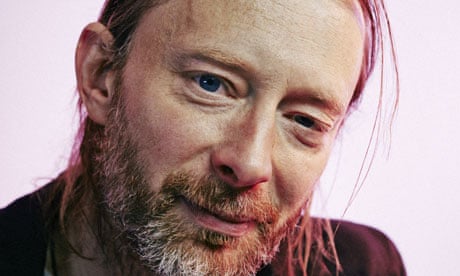
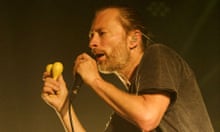
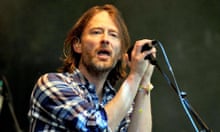
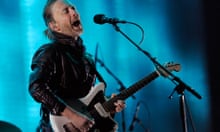
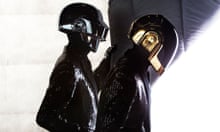
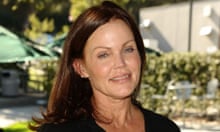
Comments (…)
Sign in or create your Guardian account to join the discussion